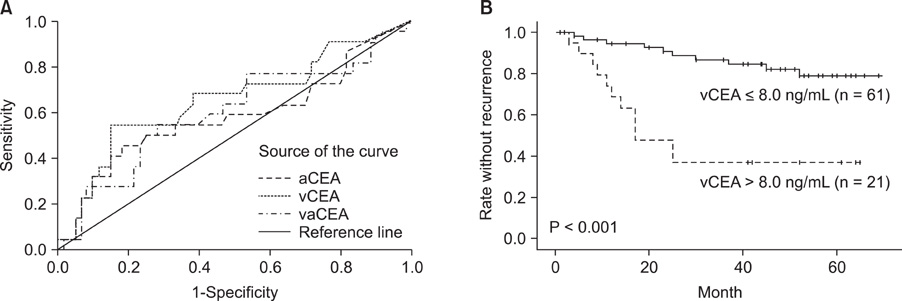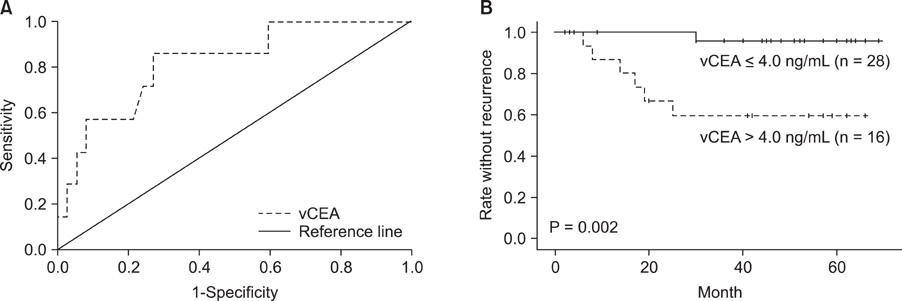J Korean Surg Soc.
2011 Dec;81(6):387-393. 10.4174/jkss.2011.81.6.387.
Carcinoembryonic antigen level of draining venous blood as a predictor of recurrence in colorectal cancer patient
- Affiliations
-
- 1Department of Surgery, Seoul National University College of Medicine, Seoul, Korea. heosc3@brm.co.kr
- 2Department of Surgery, Seoul Metropolitan Government Seoul National University Boramae Medical Center, Seoul, Korea.
- 3Department of Nuclear Medicine, Seoul National University Hospital, Seoul, Korea.
- KMID: 1445767
- DOI: http://doi.org/10.4174/jkss.2011.81.6.387
Abstract
- PURPOSE
We designed this study to evaluate the efficacy of carcinoembryonic antigen in draining venous blood (vCEA) as a predictor of recurrence.
METHODS
Draining venous and supplying arterial bloods were collected separately during the operation of 82 colorectal cancer patients without distant metastasis from September 2004 to December 2006. Carcinoembryonic antigen was measured and assessed for the efficacy as a prognostic factor of recurrence using receiver operating characteristic (ROC) and Kaplan-Meier curves.
RESULTS
vCEA is a statistically significant factor that predicts recurrence (P = 0.032) and the optimal cut-off value for vCEA from ROC curve is 8.0 ng/mL. The recurrence-free survival between patients with vCEA levels >8 ng/mL and < or =8 ng/mL significantly differed (P < 0.001). The significance of vCEA as a predictor of recurrence gets higher when limited to patients without lymph node metastasis. The proper cut-off value for vCEA is 4.0 ng/mL if confined to patients without lymph node metastasis. The recurrence-free survival between the patients of vCEA levels >4 ng/mL and < or =4 ng/mL significantly differed (P < 0.001). Multivariate analysis revealed vCEA is an independent prognostic factor in patients without lymph node metastasis.
CONCLUSION
vCEA is an independent prognostic factor of recurrence in colorectal cancer patients especially in patients without lymph node metastases.
MeSH Terms
Figure
Reference
-
1. Taal BG, Van Tinteren H, Zoetmulder FA. NACCP group. Adjuvant 5FU plus levamisole in colonic or rectal cancer: improved survival in stage II and III. Br J Cancer. 2001. 85:1437–1443.2. Wood CB, Ratcliffe JG, Burt RW, Malcolm AJ, Blumgart LH. The clinical significance of the pattern of elevated serum carcinoembryonic antigen (CEA) levels in recurrent colorectal cancer. Br J Surg. 1980. 67:46–48.3. Chau I, Allen MJ, Cunningham D, Norman AR, Brown G, Ford HE, et al. The value of routine serum carcino-embryonic antigen measurement and computed tomography in the surveillance of patients after adjuvant chemotherapy for colorectal cancer. J Clin Oncol. 2004. 22:1420–1429.4. McCall JL, Black RB, Rich CA, Harvey JR, Baker RA, Watts JM, et al. The value of serum carcinoembryonic antigen in predicting recurrent disease following curative resection of colorectal cancer. Dis Colon Rectum. 1994. 37:875–881.5. Wanebo HJ, Rao B, Pinsky CM, Hoffman RG, Stearns M, Schwartz MK, et al. Preoperative carcinoembryonic antigen level as a prognostic indicator in colorectal cancer. N Engl J Med. 1978. 299:448–451.6. Goldstein MJ, Mitchell EP. Carcinoembryonic antigen in the staging and follow-up of patients with colorectal cancer. Cancer Invest. 2005. 23:338–351.7. Bendardaf R, Lamlum H, Pyrhonen S. Prognostic and predictive molecular markers in colorectal carcinoma. Anticancer Res. 2004. 24:2519–2530.8. Pignatelli M, Durbin H, Bodmer WF. Carcinoembryonic antigen functions as an accessory adhesion molecule mediating colon epithelial cell-collagen interactions. Proc Natl Acad Sci U S A. 1990. 87:1541–1545.9. Benchimol S, Fuks A, Jothy S, Beauchemin N, Shirota K, Stanners CP. Carcinoembryonic antigen, a human tumor marker, functions as an intercellular adhesion molecule. Cell. 1989. 57:327–334.10. Watine J, Miedouge M, Friedberg B. Carcinoembryonic antigen as an independent prognostic factor of recurrence and survival in patients resected for colorectal liver metastases: a systematic review. Dis Colon Rectum. 2001. 44:1791–1799.11. Wiratkapun S, Kraemer M, Seow-Choen F, Ho YH, Eu KW. High preoperative serum carcinoembryonic antigen predicts metastatic recurrence in potentially curative colonic cancer: results of a five-year study. Dis Colon Rectum. 2001. 44:231–235.12. Takagawa R, Fujii S, Ohta M, Nagano Y, Kunisaki C, Yamagishi S, et al. Preoperative serum carcinoembryonic antigen level as a predictive factor of recurrence after curative resection of colorectal cancer. Ann Surg Oncol. 2008. 15:3433–3439.13. Tabuchi Y, Deguchi H, Saitoh Y. Carcinoembryonic antigen and carbohydrate antigen 19-9 levels of peripheral and draining venous blood in colorectal cancer patients. Correlation with histopathologic and immunohistochemical variables. Cancer. 1988. 62:1605–1613.14. Tabuchi Y, Deguchi H, Imanishi K, Saitoh Y. Carcinoembryonic antigen levels of peripheral and draining venous blood in patients with colorectal cancer. Correlation with survival. Cancer. 1992. 69:2411–2417.15. Kanellos I, Zacharakis E, Kanellos D, Pramateftakis MG, Tsahalis T, Altsitsiadis E, et al. Prognostic significance of CEA levels and detection of CEA mRNA in draining venous blood in patients with colorectal cancer. J Surg Oncol. 2006. 94:3–8.16. Gold P, Freedman SO. Specific carcinoembryonic antigens of the human digestive system. J Exp Med. 1965. 122:467–481.17. Wagener C, Müller-Wallraf R, Nisson S, Gröner J, Breuer H. Localization and concentration of carcinoembryonic antigen (CEA) in gastrointestinal tumors: correlation with CEA levels in plasma. J Natl Cancer Inst. 1981. 67:539–547.18. Pihl E, McNaughtan J, Ward HA, Nairn RC. Immunohistological patterns of carcinoembryonic antigen in colorectal carcinoma. Correlation with staging and blood levels. Pathology. 1980. 12:7–13.19. Harrison LE, Guillem JG, Paty P, Cohen AM. Preoperative carcinoembryonic antigen predicts outcomes in node-negative colon cancer patients: a multivariate analysis of 572 patients. J Am Coll Surg. 1997. 185:55–59.20. Wang WS, Lin JK, Chiou TJ, Liu JH, Fan FS, Yen CC, et al. Preoperative carcinoembryonic antigen level as an independent prognostic factor in colorectal cancer: Taiwan experience. Jpn J Clin Oncol. 2000. 30:12–16.21. Park IJ, Kim HC, Yu CS, Yoo JH, Kim JC. Cutoff values of preoperative s-CEA levels for predicting survivals after curative resection of colorectal cancer. J Korean Med Sci. 2005. 20:624–627.22. Park YA, Lee KY, Kim NK, Baik SH, Sohn SK, Cho CW. Prognostic effect of perioperative change of serum carcinoembryonic antigen level: a useful tool for detection of systemic recurrence in rectal cancer. Ann Surg Oncol. 2006. 13:645–650.23. Goslin R, Steele G Jr, Macintyre J, Mayer R, Sugarbaker P, Cleghorn K, et al. The use of preoperative plasma CEA levels for the Stratification of patients after curative resection of colorectal cancers. Ann Surg. 1980. 192:747–751.24. Moertel CG, O'Fallon JR, Go VL, O'Connell MJ, Thynne GS. The preoperative carcinoembryonic antigen test in the diagnosis, staging, and prognosis of colorectal cancer. Cancer. 1986. 58:603–610.25. Lloyd JM, McIver CM, Stephenson SA, Hewett PJ, Rieger N, Hardingham JE. Identification of early-stage colorectal cancer patients at risk of relapse post-resection by immunobead reverse transcription-PCR analysis of peritoneal lavage fluid for malignant cells. Clin Cancer Res. 2006. 12:417–423.26. Lewi H, Blumgart LH, Carter DC, Gillis CR, Hole D, Ratcliffe JG, et al. Pre-operative carcino-embryonic antigen and survival in patients with colorectal cancer. Br J Surg. 1984. 71:206–208.27. Staab HJ, Anderer FA, Brümmendorf T, Stumpf E, Fischer R. Prognostic value of preoperative serum CEA level compared to clinical staging. I. Colorectal carcinoma. Br J Cancer. 1981. 44:652–662.28. Benson AB 3rd, Schrag D, Somerfield MR, Cohen AM, Figueredo AT, Flynn PJ, et al. American Society of Clinical Oncology recommendations on adjuvant chemotherapy for stage II colon cancer. J Clin Oncol. 2004. 22:3408–3419.
- Full Text Links
- Actions
-
Cited
- CITED
-
- Close
- Share
- Similar articles
-
- Serum Carcinoembryonic Antigen for Recurrence in Colorectal Cancer Patients
- The Comparative Study between Peripharal Venous Blood and Draining Venous Blood CEA Levels in Colorectal Cancer
- Individualized Cutoff Value of the Serum Carcinoembryonic Antigen Level According to TNM Stage in Colorectal Cancer
- The Effect of Tumor Manipulation on Serum Carcinoembryonic Antigen Levels in Colorectal Cancer Patients
- Changes of serum carcinoembryonic antigen in patients with colorectal cancer




